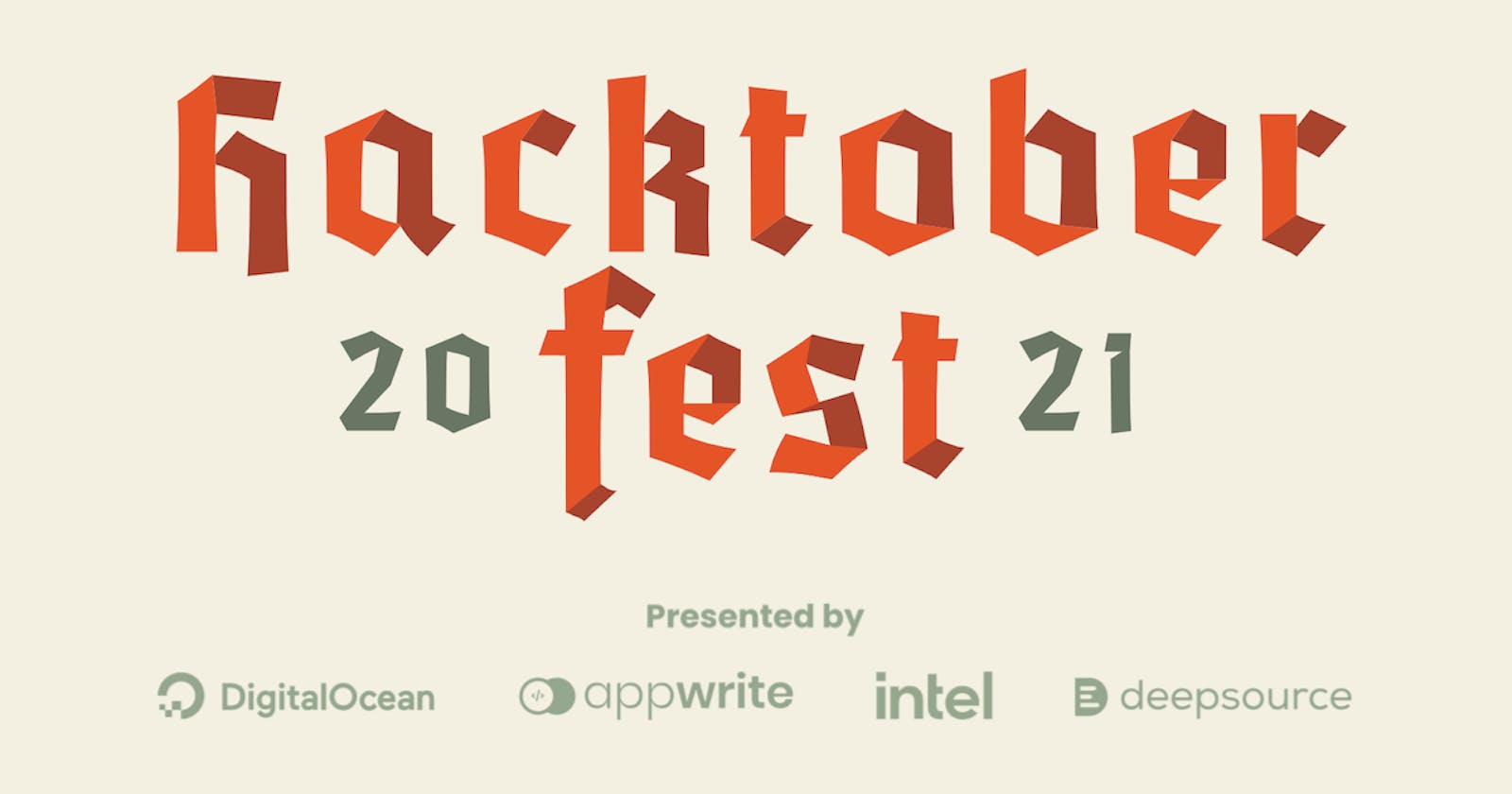In this article, I am covering this year's Hacktoberfest, what it is, and how to participate! This article will be the first in a series of articles covering registering, contributing, and maintaining!

What is Hacktoberfest
Hacktoberfest is a seasonal event that promotes engagement in open-source projects. 2021 will mark Hacktoberfest's eighth year! The event takes place in October, and DigitalOcean hosts the event.
The Hacktoberfest website informs us of how we can participate:
- Prepare and share your project for collaboration
- Contribute to the betterment of a project via pull requests
- Organize an event
- Mentor others
- Donate directly to open-source projects
Programmers that contribute to four Hacktoberfest participating projects via qualifying pull requests earn exclusive Hacktoberfest swag!
Open-source projects
Ok, it sounds fun, but what are open-source projects?
Basically, open-source projects are collaborative community-created programs that are publicly available to download, alter, and distribute.
Wikipedia: Open-source software
Open-source software (OSS) is computer software that is released under a license in which the copyright holder grants users the rights to use, study, change, and distribute the software and its source code to anyone and for any purpose. Open-source software may be developed in a collaborative public manner. Open-source software is a prominent example of open collaboration, meaning any capable user is able to participate online in development, making the number of possible contributors indefinite. The ability to examine the code facilitates public trust into the software.
One of the most famous open-source software projects is Microsoft's code editor, Visual Studio Code.
( I'm using Visual Studio Code to create this article! )
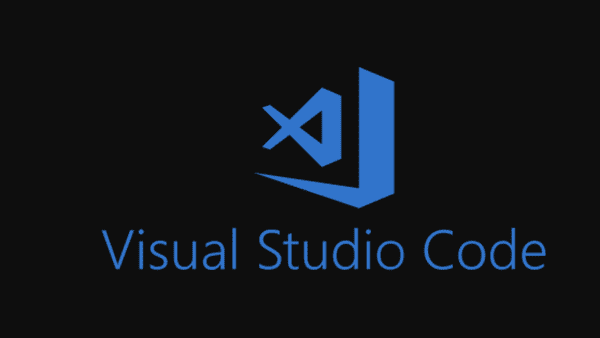
Information from GitHub:
Visual Studio Code - Open Source ("Code - OSS")
The Repository
This repository ("Code - OSS") is where we (Microsoft) develop the Visual Studio Code product together with the community. Not only do we work on code and issues here, we also publish our roadmap, monthly iteration plans, and our endgame plans. This source code is available to everyone under the standard MIT license.

Pull requests
Right, so now that we know what an open-source project is, how do we interact with them?
In simple terms, to interact and contribute to an open-source project, you first download the project, add or make changes to the code, and then submit a pull request, which means that your changes will be uploaded and incorporated into the project upon approval.
Since the process of creating a pull request is beyond the scope of this article, I will refer you to a good source created by the host of hacktoberfest, Digitalocean:
Digitalocean Tutorial: How To Create a Pull Request on GitHub
Taking part in Hacktoberfest
To participate in Hacktoberfest, you need to have a GitHub or a GitLab account and register for the event.
Also, it's important to note that you have to contribute to Hacktoberfest participating repositories.

Getting started
I documented the following steps while I registered for the Hacktoberfest event.
Step 1
To participate in Hacktoberfest, you need to register on the hacktoberfest website. You will need to have a GitHub or GitLab account and use that account to register here: hacktoberfest: register
Step 2
After registering, there is an "about you" form to fill out, and it also includes information on Hacktoberfest's rules and values.
Step 3
Happy Hacking!
Your profile will now: "track your pull request progress, help you find cool projects, and provide open-source resources."
You are now prompted to "Read our Values," and "Quality Standards" learn how to Reduce Spam and familiarize yourself with the rules.
Check the acknowledgment boxes and click the "Start Hacking!"
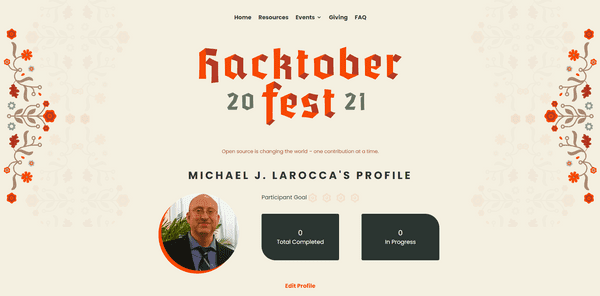
Note: You can edit your profile after creating it by clicking on "Edit Profile" on the profile page. Make sure you have the "Participant" check box checked, and if you plan to be a maintainer, make sure you have the "Maintainer" check box checked.
Your Profile
Once you have created your Hacktoberfest profile by connection to your GitHub or GitLab account, you can access your profile page at https://hacktoberfest.digitalocean.com/profile.
Your profile page displays how many participation goals you complete and how many participation goals are in progress.
With your newly created profile, you are now ready to contribute quality pull requests with participating Hacktoberfest repositories.
So, what are the "quality standards?"
To qualify and earn Hacktoberfest 2021 swag, you must participate by contributing quality pull requests to four participating Hacktoberfest repositories.
The main question that I have is, "what qualifies as a quality contribution?"
Here is the detailed list provided by Hacktoberfest's quality standards:
details
In line with Hacktoberfest value #2 (Quantity is fun, quality is key), we have provided examples of the pull requests that we consider to be low-quality contributions (which we discourage and may be marked as spam by maintainers).
examples of low-quality contributions
- Pull requests that are automated e.g. scripted opening pull requests to remove whitespace / fix typos / optimize images.
- Pull requests that are disruptive e.g. taking someone else's branch/commits and making a pull request.
- Pull requests that are regarded by a project maintainer as a hindrance vs. helping.
- Something that's clearly an attempt to simply +1 your pull request count for October.
- Last but not least, one pull request to fix a typo is fine, but 5 pull requests to remove a stray whitespace is not.
Hacktoberfest repositories
Ok. So now that we have our profile and know what "quality contributions" are, where are the participating Hacktoberfest repositories?
So I thought, "what better way is there to find out than to ask the tech Twitter community and tag all of the premium partners?"
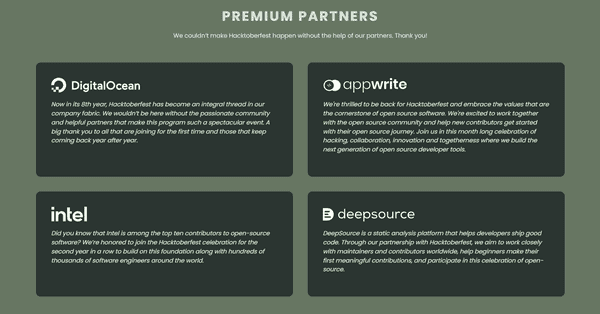
Premium Partners
- DigitalOcean
- appwrite
- intel
- deepsource
And you know what? Without missing a beat, I got a response from them!
deepsource
Deepsource provided a website that contains beginner-friendly code quality issues that need fixing: deepsource.io/discover.
Deepsource also has a Discord channel: deepsource.io/discord
appwrite
Appwrite provided a website with over 200 beginner-friendly issues across their repositories: hacktoberfest.appwrite.io
Appwrite also provided a Discord channel: appwrite.io/discord
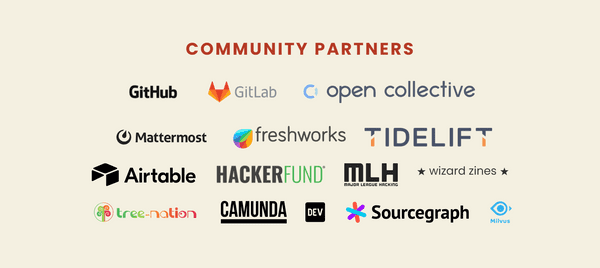
Hacktoberfest repositories I'm participating in
To my pleasant surprise, I was personally invited by Ayodele Samuel Adebayo, also known as Unclebigbay, to participate in his hacktoberfest-accepted project!
Ayodele Samuel Adebayo hacktoberfest-accepted project:
Nigeria Presidents
Profile list of Nigeria past to present Presidents who ruled from 1960 till date.
GitHub repository: nigeria-presidents
To learn more about Ayodele Samuel Adebayo (Unclebigbay), you can read my article covering one of his amazing projects: Exploring The Advice Hub: A Centralized Advice Center for Developers
Scrimba's Weekly Web Dev Challenge Submissions
I reached out to Leanne and expressed my interest to participate in the Scrimba "Weekly Web Dev Challenge Submissions" hacktoberfest-accepted project.
She gave me a choice of two issues; I chose to add icons to the links on the footer pages.
It sounded like an easy contribution; all I had to do was utilize font awesome and adjust the icons next to the links. However, there is no icon for the Scrimba logo!
No worries. I already came up with a solution, and I will cover it in an upcoming article in this Hacktoberfest series!
GitHub repository: Weekly web dev challenge poll
Visit Site: 🔗Scrimba weekly webdev challenge scrimba
To learn more about Scrimba's Weekly Web Dev Challenge, you can read my review article!
Review: ScrimbaWebDevChallenge
I will participate in Hacktoberfest participating repositories, document the process, and publish them in my upcoming article series!
Conclusion
Hacktoberfest is a seasonal event that promotes engagement in open-source projects.
This first article in the series discusses what Hacktoberfest is in detail and includes step-by-step instructions on registering for the event.
My upcoming articles in the series will document the process of participating in Hacktoberfest registered projects!

